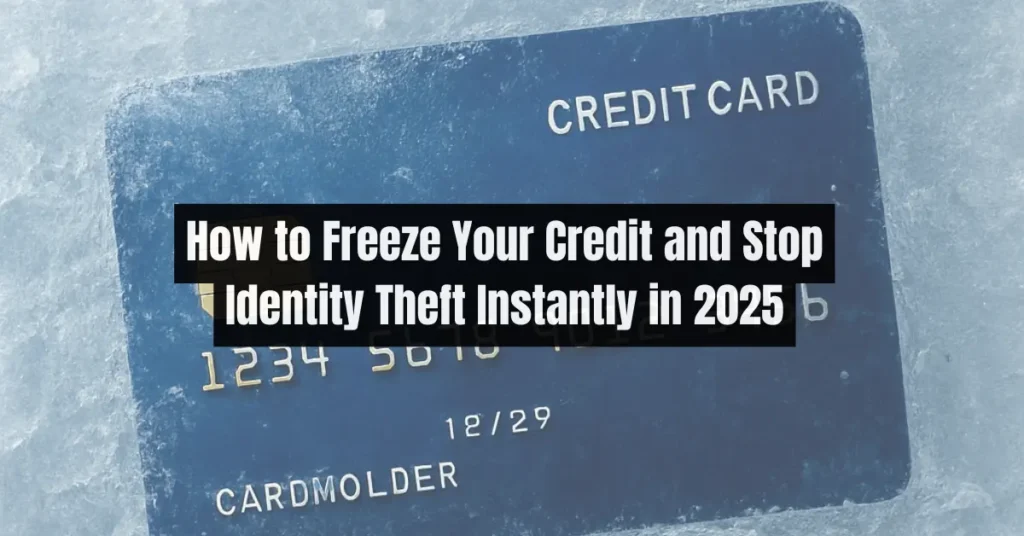🔒 How to Freeze Your Credit Instantly in 2025 (Before Identity Thieves Do It First!)
With data breaches and identity theft on the rise, learning how to freeze your credit has never been more important. In fact, over 1 in 5 Americans were impacted by credit fraud in 2024 alone—and 2025 is trending higher.
If you’ve ever applied for a credit card, mortgage, or auto loan, your personal information is stored by credit bureaus. Freezing your credit prevents criminals from opening new accounts in your name—even if they have your Social Security number.
This guide will walk you through what a credit freeze is, how to do it step-by-step, why it’s different from a fraud alert, and when you should unfreeze it. It’s simple, free, and one of the smartest financial safety moves you can make this year.
✅ What Is a Credit Freeze?
A credit freeze (also known as a security freeze) is a free tool that restricts access to your credit report. When frozen, lenders cannot check your credit file to approve new loans or credit cards—making it nearly impossible for identity thieves to open fraudulent accounts in your name.
It does not affect your existing credit cards or loans, and it does not lower your credit score. You can still use your credit as usual—you just won’t be able to apply for new credit until you lift the freeze.
🆚 Credit Freeze vs Fraud Alert
| Feature | Credit Freeze | Fraud Alert |
|---|---|---|
| Cost | Free | Free |
| Blocks new credit checks | Yes | No |
| Requires unfreezing | Yes | No |
| Lasts | Indefinitely (until you lift it) | 1 year (can be extended) |
| Best for | Complete protection | Suspected fraud or active victim |
If you’re a confirmed victim of ID theft, you can also place an extended fraud alert for up to 7 years.
🛡️ Why Freeze Your Credit?
Here’s why it’s one of the best financial protection steps you can take in 2025:
- 🚫 Stops identity theft: Thieves can’t open new credit in your name.
- 📉 Doesn’t hurt your credit score.
- 💳 Won’t affect current loans or credit cards.
- 🆓 Completely free, unlike third-party services.
- 🔓 Can be lifted anytime with a PIN or password.
It’s especially useful if:
- You were affected by a data breach.
- Your wallet, phone, or SSN was stolen.
- You don’t plan to open new credit in the near future.
🧭 How to Freeze Your Credit (Step-by-Step)
To freeze your credit, you must contact all three major credit bureaus in the U.S.: Equifax, Experian, and TransUnion. The process takes 10–15 minutes.
1. Freeze Your Credit with Equifax
- Visit: https://www.equifax.com/personal/credit-report-services/
- Create an account or sign in.
- Choose “Place a Freeze” → Follow prompts.
- Create a secure PIN/password for future access.
📞 Phone: 1-800-349-9960
📬 Mail: Equifax Security Freeze, P.O. Box 105788, Atlanta, GA 30348
2. Freeze Your Credit with Experian
- Visit: https://www.experian.com/freeze/center.html
- Sign in or create an account.
- Select “Add a Freeze” → Verify identity → Set PIN.
📞 Phone: 1‑888‑397‑3742
📬 Mail: Experian Security Freeze, P.O. Box 9554, Allen, TX 75013
3. Freeze Your Credit with TransUnion
- Visit: https://www.transunion.com/credit-freeze
- Click “Add Freeze” → Follow identity verification.
- Set your account credentials or PIN.
📞 Phone: 1‑888‑909‑8872
📬 Mail: TransUnion, P.O. Box 2000, Chester, PA 19016
📱 Can I Freeze My Credit on Mobile?
Yes! All three bureaus offer mobile apps:
- Equifax: “myEquifax”
- Experian: “Experian”
- TransUnion: “TransUnion: Credit Score & Report”
Apps make it easier to freeze, unfreeze, or refreeze instantly on the go.
🔓 How to Unfreeze Your Credit
Planning to apply for a new loan or job?
You can temporarily lift the freeze:
- Log in to your account at the bureau’s website or app.
- Choose to:
- Unfreeze permanently
- Unfreeze for a specific time (e.g., 3 days)
- Unfreeze for a specific lender (via one bureau)
- Use your PIN or password to confirm
🔁 Once your application is complete, refreeze your report to stay protected.
🕒 How Long Does a Credit Freeze Last?
In the U.S., a credit freeze lasts indefinitely—until you remove it. That means you don’t need to renew it annually.
In some other countries (like Canada), freezes may expire after a set period unless extended.
💰 Does It Cost Anything?
No. Thanks to U.S. federal law, credit freezes are 100% free across all bureaus.
In India, the process is slightly different—CIBIL does not offer credit freezes yet, but you can lock/unlock your reports by contacting them directly.
⚠️ Common Myths About Credit Freezing
- “Freezing affects my score” – ❌ FALSE
→ A freeze has no impact on your credit score. - “I can’t use my credit cards” – ❌ FALSE
→ You can still use all existing cards and loans. - “Freezing stops all fraud” – ❌ FALSE
→ It stops new account fraud, but not existing account misuse. Always monitor accounts. - “I can’t apply for a job with a freeze” – ❌ FALSE
→ Employment credit checks are soft inquiries; won’t be blocked.
🧠 Pro Tips for Credit Freezing
- Freeze your children’s credit too—child identity theft is on the rise.
- Keep your PINs secure. Losing them can delay unfreezing.
- Monitor your credit reports for suspicious activity even after freezing.
- Consider using free credit monitoring apps (e.g., Credit Karma, CreditWise).
📄 What If You’re Outside the U.S.?
- Canada: You can place security freezes via Equifax/TransUnion Canada for a fee.
- UK: Freezes aren’t offered, but you can add Notice of Correction or use CIFAS protection.
- India: Credit freezes are not available, but you can lock/unlock your reports via CIBIL, Experian India, and CRIF HighMark manually.
🧾 Real User Story: Why Freezing Matters
“I froze my credit after a data breach at my health provider. A month later, someone tried to open a credit card in my name—and got denied. Best 10 minutes I ever spent.”
– Ravi S., Chicago, IL
✍️ Final Thoughts: Why You Should Freeze Your Credit Now
If you’re not applying for new credit in the next few weeks, there’s no downside to freezing your credit. It’s one of the easiest and most effective tools to prevent identity theft in 2025.
- ✅ It’s free
- ✅ It’s secure
- ✅ It takes just minutes
- ✅ It gives you peace of mind
So why wait? Freeze your credit before scammers do. And stay protected in a world where data breaches are no longer if, but when.

